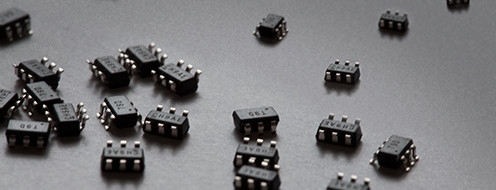ATMEL 8-bit tinyAVR MCU
Unmatched Performance and Efficiency in a Small Package
Atmel® tinyAVR® microcontrollers (MCUs) are optimized for applications that require performance, power efficiency and ease of use in a small package. All tinyAVR devices are based on the same architecture and compatible with other AVR® devices. The integrated ADC, DAC, AC, EEPROM memory and brown-out detector let you build applications without adding external components. tinyAVR devices also offer Flash memory and on-chip debug for fast, secure and cost-effective in-circuit upgrades that significantly cut your time to market.
These devices are supported by the Atmel Studio development platform. It enables code development in C or Assembly, provides cycle-accurate simulation and integrates seamlessly with starter kits, programmers, debuggers, evaluation kits and reference designs. This results in faster development and a more productive development team.
tinyAVR devices offer an unrivalled combination of miniaturization, processing power, analog performance and system-level integration. The tinyAVR MCU is the most compact, feature-rich device in the AVR family—and the only device capable of operating at just 0.7V.
The new Value Line versions of the latest tinyAVR products provide more cost-efficient alternatives for applications requiring basic features.
Key Features
Atmel® tinyAVR® microcontrollers (MCUs) are optimized for applications that require performance, power efficiency and ease of use in a small package. All tinyAVR devices are based on the same architecture and compatible with other AVR® devices. The integrated ADC, DAC, AC, EEPROM memory and brown-out detector let you build applications without adding external components. tinyAVR devices also offer Flash memory and on-chip debug for fast, secure and cost-effective in-circuit upgrades that significantly cut your time to market.
These devices are supported by the Atmel Studio development platform. It enables code development in C or Assembly, provides cycle-accurate simulation and integrates seamlessly with starter kits, programmers, debuggers, evaluation kits and reference designs. This results in faster development and a more productive development team.
tinyAVR devices offer an unrivalled combination of miniaturization, processing power, analog performance and system-level integration. The tinyAVR MCU is the most compact, feature-rich device in the AVR family—and the only device capable of operating at just 0.7V.
The new Value Line versions of the latest tinyAVR products provide more cost-efficient alternatives for applications requiring basic features.
Key Features
- Small — Atmel tinyAVR devices are designed specifically for applications where size and cost are critical. The smallest tinyAVR MCU measures only 1.5 mm x 1.4 mm. You can employ it as a single-chip solution in small systems or use it to deliver glue logic and distributed intelligence in larger systems.
-
Capacitive Touch — The QTouch® Library makes it simple to embed capacitive-touch button, slider and wheel functionality into general-purpose AVR microcontroller applications. The royalty-free QTouch Library provides several library files for each device and supports different numbers of touch channels, enabling both flexibility and efficiency in touch applications.
The latest 8 KB and 16 KB tinyAVR devices feature the successful QTouch Peripheral Touch Controller (PTC). The PTC acquires signals in order to detect touch on capacitive sensors and supports both self- and mutual-capacitance sensors. When used with the QTouch Composer development tool (QTouch Library project builder and QTouch Analyzer), it provides a faster and less complex capacitive touch implementation in any application.
- Fast and Code Efficient — The AVR CPU gives the tinyAVR devices the same high performance as larger AVR devices and several times the processing power of any similarly-sized competitor. Flexible and versatile, tinyAVR devices feature high code efficiency that makes them ideal for a broad range of applications.
- High Integration — Each pin has multiple uses as I/O, ADC and PWM. Even the reset pin can be reconfigured as an I/O pin. Some tinyAVR devices feature a Universal Serial Interface (USI), which can be used as SPI, UART or TWI, while others have dedicated hardware for these serial interfaces.
- 0.7V Operation — Where most microcontrollers require 1.8V or more to operate, the tinyAVR offers a boost regulator to boost the voltage from a single AA or AAA battery into a stable 3V supply to power the entire application.
- Internet of Things (IoT) Ready — The IoT can extend to almost any application—from typical building and home automation to medical and healthcare systems. IoT designs typically require some form of processing power to perform embedded computing tasks and transmit data to the Internet. Increasingly, these devices are battery driven, so power consumption often becomes the key success factor for a user-friendly IoT-enabled product. tinyAVR devices are among the best MCUs in the world when it comes to power consumption, making them a natural choice for IoT applications.
Sorry, Currently No Video Uploaded.
Sorry, Currently No File Uploaded.
ATMEL 8-bit tinyAVR MCU
Please Leave Your Product Enquiry Here. We will Get Back To You Soon.
Product Specifications
- Product SKU : -
- Weight (GRAM) : -
- Dimension : -
Related Products
Locate Us
Mobicon - Remote Electronic Pte Ltd




